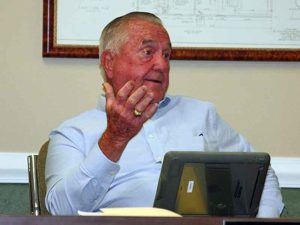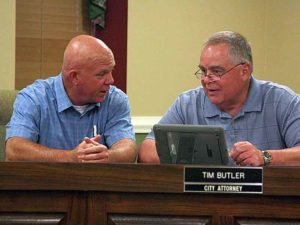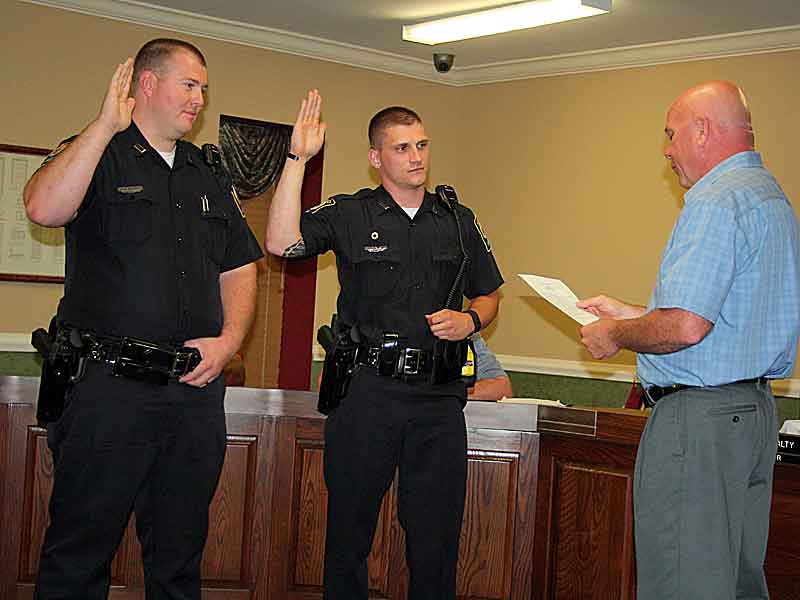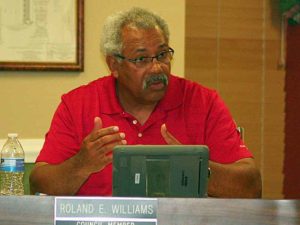Council moves to reduce raises for top-paid workers in FY 2016-17 budget
By JIM BROOKS
Nelson County Gazette / WBRT Radio
Tuesday, June 14, 2016, 11:45 p.m. — The Bardstown City Council was scheduled to hold first reading of the city’s 2016-17 budget Tuesday evening, but those plans fell through in part because of the council changed its mind on employee raises.
The original proposal was to give employees who make less than $20 an hour a 4 percent raise. Those who make more than $20 an hour would receive a 3 percent raise.

Councilman Bobby Simpson gestures during a discussion of using utility profits to pay for the city’s general fund expenses.
Tracy Hudson, the city’s chief financial officer, had been asked at the council’s working session last Tuesday to prepare an alternative budget based on reducing the pay increase percentages from 4 and 3 percent to 3 and 2 percent.
However the council wasn’t ready to adopt either pay rate increase proposal Tuesday night.
Rather than adopt either proposal, the council discussion focused on giving higher raises to those employees who were made less than $20 an hour and further reducing the raises for those who make more than $20 an hour.
The council eventually agreed on a plan that will give 4 percent raises for those who make under $20 an hour and 2 percent for those who make over that amount.
But because Hudson did not have a budget proposal prepared based on the new sets of numbers, the council will need to hold a special-called meeting at 5 p.m. Thursday to approve first-reading on the 2016-17 budget.
The special budget meeting was also necessary to allow changes to the budget after some applied-for fire department grants were not properly accounted for in the budget. A $150,000 staffing grant was accounted for as revenue but not accounted for in the budget as an expenditure. The grant would pay for three new firefighters.
Hudson said the budget didn’t include the three firefighter positions the grant would pay for.
Fire Chief Randy Walker told the council the two-year grant would pay for the three firefighter’s salaries for two years. Several council members said they were under the belief the grant required the city to pay the firefighters salaries for at least one additional year after the grant money was spent. Walker said the council was under no obligation to do so after the grant funds were exhausted.
The council also briefly discussed the council’s contingency fund, which it had agreed last week to keep. Royalty told the council that he believed the contingency money was no longer necessary since the council members will now have $1,000 each in training money for their own continuing education.
The contingency fund was created years ago to allow the council as a group to seek outside legal assistance if it was necessary. In the end, the council agreed to keep the fund in its budget.
TAXES. During the budget discussion, Hagan again brought up the need for raise taxes later this year in order to reduce the dependence on the city budget’s use of utility revenue.
When Hagan mentioned the topic last week, the council appeared willing to listen; however Tuesday night there was no consensus about the need to raise taxes this year.
Councilman Francis Lydian said he wasn’t ready to raise taxes. He told the council the city had several good revenue streams in its utilities, and called for making more efficient use of those revenues.
“If we analyze and evaluate before we spend money, we have plenty of money without raising taxes,” he said.
Councilman Bobby Simpson said he agreed that the city utilities need to have money for maintenance and repairs, but he also understood the revenue they create is beneficial to city by helping fund the general fund. Years ago the city’s leaders saw the wisdom in owning its own utilities, and the revenue it generates that has helped the city for many years.

Mayor John Royalty and Tim Butler, city attorney, talk prior to the start of Tuesday’s council meeting.
Hagan said that the city utilities’ long-range planning includes some substantial projects that will need adequate funding.
“If we keep spending the utility reserves on the general fund side, I’m afraid we’re going to run show on the utility side eventually,” he told the council. “Not this year, not next year, not the year after that.”
The council took no action related to taxes.
In other business, the council:
— approved a resolution regarding the county’s industrial revenue bonds for a Heaven Hill Distilleries bottling house project. The bonds mean the property will avoid property tax assessments for the 30-year term of the bonds.
— approved a resolution to allow the mayor to sign the necessary documents to receive Municipal Road money for street repairs.
— approved the DRB recommendation for a 4,800 square-foot shop building at 121 Banjo St.;
— approved re-appointing John Harned to three-year term on the Assessment Board of Appeals;
— approved firework permit requests from the Assembly of God Church and Freedom Raise Ministry;
— approved a $500 donation request from the Nelson County Community Clinic for their 5k walk/run.
-30-








